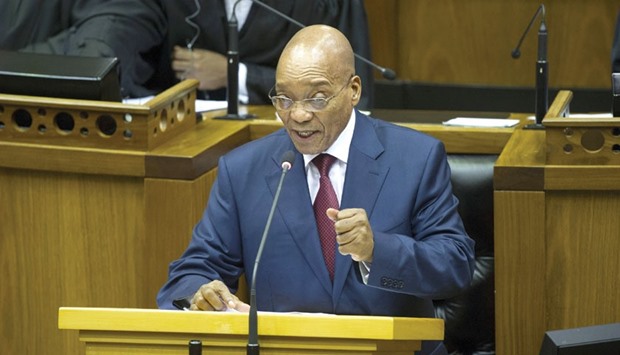
Zuma: No evidence (of corruption or fraud) was found.
South African President Jacob Zuma said yesterday that an investigation into a major government arms deal arranged in the late 1990s had found no evidence of corruption or fraud.
Critics denounced the findings as a cover-up and said they would continue to campaign for justice, including a possible legal challenge in the United States under US anti-graft laws.
The 30bn rand ($2bn) deal to buy European military equipment has cast a shadow over politics in Africa’s most industrialised economy for years.
Zuma – then deputy president – was linked to the deal through his former financial adviser, who was jailed for corruption.
This almost torpedoed Zuma’s bid for president but all charges against him were dropped in 2009.
“No evidence was found as well through the Commission’s own independent inquiries,” Zuma said in a televised address yesterday.
Zuma said that the three-volume report on the investigation, which heard evidence from senior politicians including Thabo Mbeki, the former president, and ex-cabinet ministers, would be made public.
Mbeki defended the decision to spend billions on arms despite dire poverty in a country emerging from the apartheid era.
He said the government wanted to reclaim the defence force from the white-minority regime ousted by Nelson Mandela and the African National Congress (ANC) in 1994.
The commission found that the purchase of the weapons was “necessary”.
Former banker and anti-arms campaigner Terry Crawford-Browne, who sued the government, leading to the establishment of the commission of inquiry into the arms deal, said that he would challenge the investigation’s findings.
“The report is a whitewash, the whole thing is a farce,” Crawford-Browne said.
The probe had ignored documentary evidence gathered in a separate investigation by the state, he said.
Crawford-Browne said he would ask his lawyers to consider taking the case to the Constitutional Court, South Africa’s top court, or to the United States to be tried under the Foreign Corrupt Practices Act.
The opposition Democratic Alliance (DA) party called the commission’s report “a massive disappointment because those who were implicated in arms deal corruption have effectively been let off the hook”.
Paul Hoffman, a lawyer representing anti-arms-deal activists, likened the inquiry to “a farce”.
Andrew Feinstein, a former African National Congress (ANC) member of parliament who has long called for more investigations into the deal, said in a statement that “this was not the end of the road in the struggle for accountability of corruption in the arms deal”.
The Minister in the Presidency, Jeff Radebe, denied the commission was a whitewash, saying: “We trust these findings will bring final closure to this long drawn-out process.”
Zuma’s former financial adviser, Schabir Shaik, was found guilty and jailed in 2005 of trying to solicit bribes worth 500,000 rand a year for Zuma from a French arms company.
Then-president Mbeki sacked Zuma after his deputy was also implicated in the deal.
It was alleged that Zuma had offered to protect the French firm from an investigation into the deal.
Zuma later ousted Mbeki to win leadership of the ANC.
In 2009, a month after prosecutors dropped an investigation into more than 700 charges of fraud, corruption and racketeering relating to the same arms deal, Zuma became president.
Zuma said the four-year investigation he set up in 2011 had found no evidence of widespread bribery, corruption or fraud in the selection of the preferred bidder to supply the arms.
Nor had it found evidence that officials were bribed in an attempt to influence the deal.
The South African leader has been beset by scandal during his tenure.
Earlier this month, he survived an impeachment vote after the Constitutional Court said he breached the law by ignoring an order to repay some of the $16mn in state funds spent on renovating his home.
In December he was widely criticised for changing his finance minister twice in a week, sending the rand plummeting and alarming investors.
